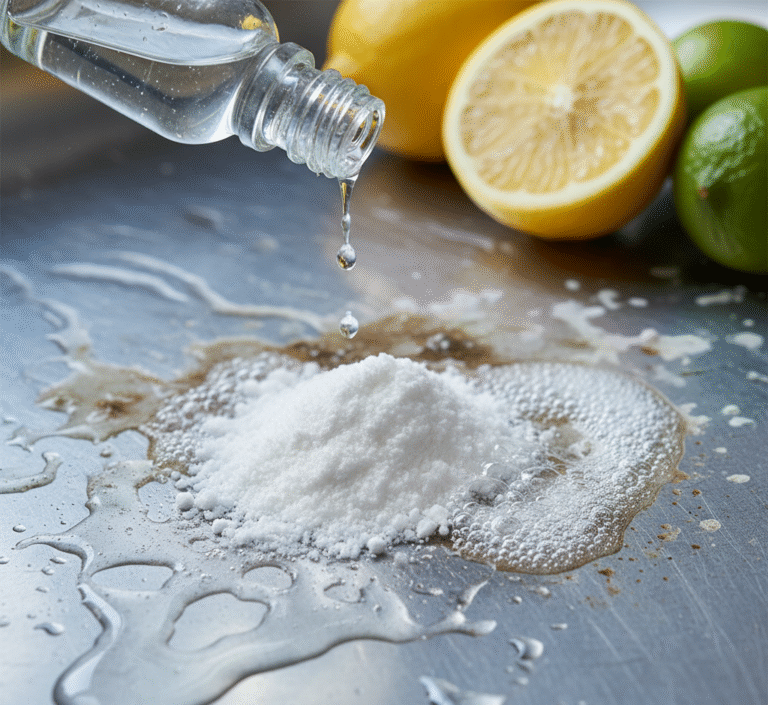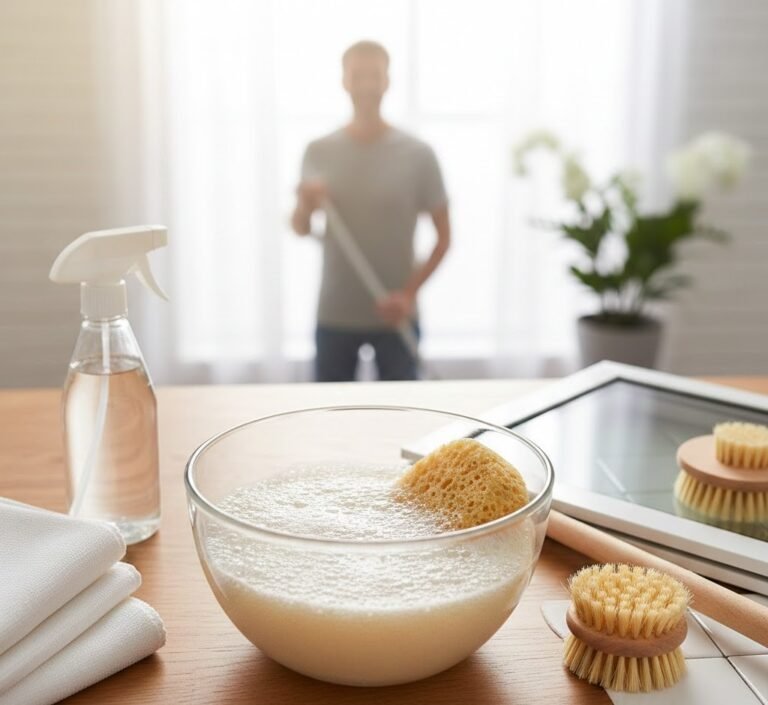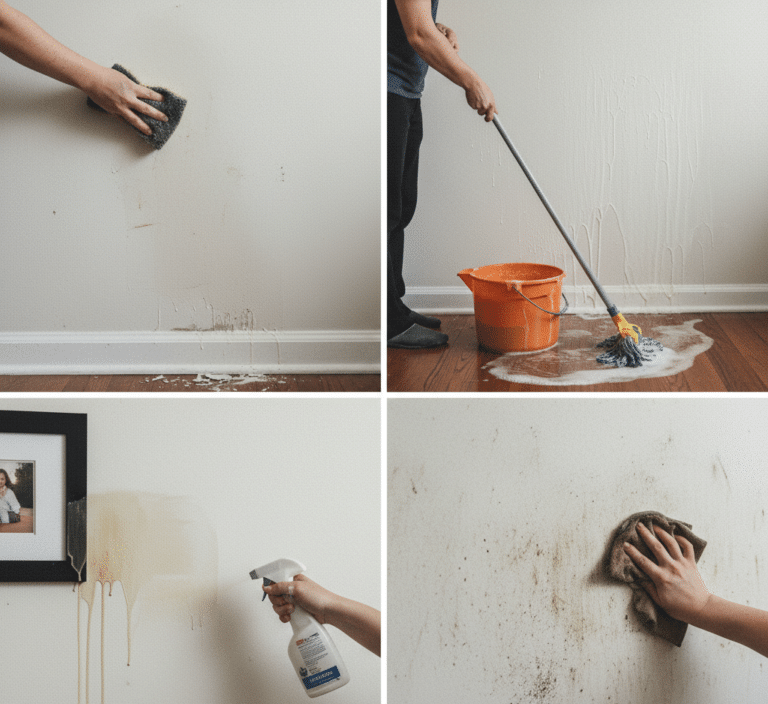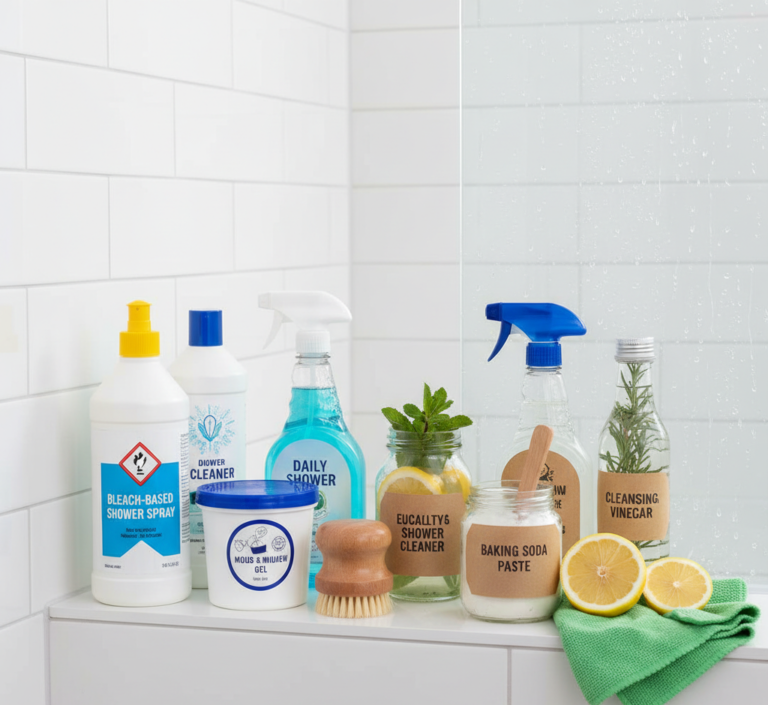In the world of cleaning, there’s citric acid, and countless products that promise miraculous results, often based on complex chemical formulations and strong scents. Yet, hiding in plain sight, often in the baking aisle of the grocery store, is a simple, effective, and remarkably versatile compound: citric acid. This white crystalline powder, derived naturally from citrus fruits like lemons and limes, is a powerhouse cleaner that can tackle some of the most stubborn household problems, particularly those related to mineral deposits and hard water. Its strength lies in its chemical nature as a weak organic acid, which allows it to dissolve grime, limescale, and soap scum without the corrosive intensity of stronger mineral acids.
Chelation
The primary mechanism that makes citric acid so effective is a process called chelation. In areas with hard water, the water is rich in dissolved minerals, primarily calcium and magnesium. When this water evaporates, it leaves behind a chalky, crusty residue known as limescale. This is the buildup you see inside your kettle, on your showerheads, and as a cloudy film on your glassware. Citric acid works by binding to these mineral ions, forming a compound called a chelate. This new compound is water-soluble, meaning the stubborn, stuck-on mineral deposit is transformed into something that can be easily rinsed away. This is a far more effective approach than simply trying to scrub the deposit off, which is often a losing battle and can damage the surface underneath.
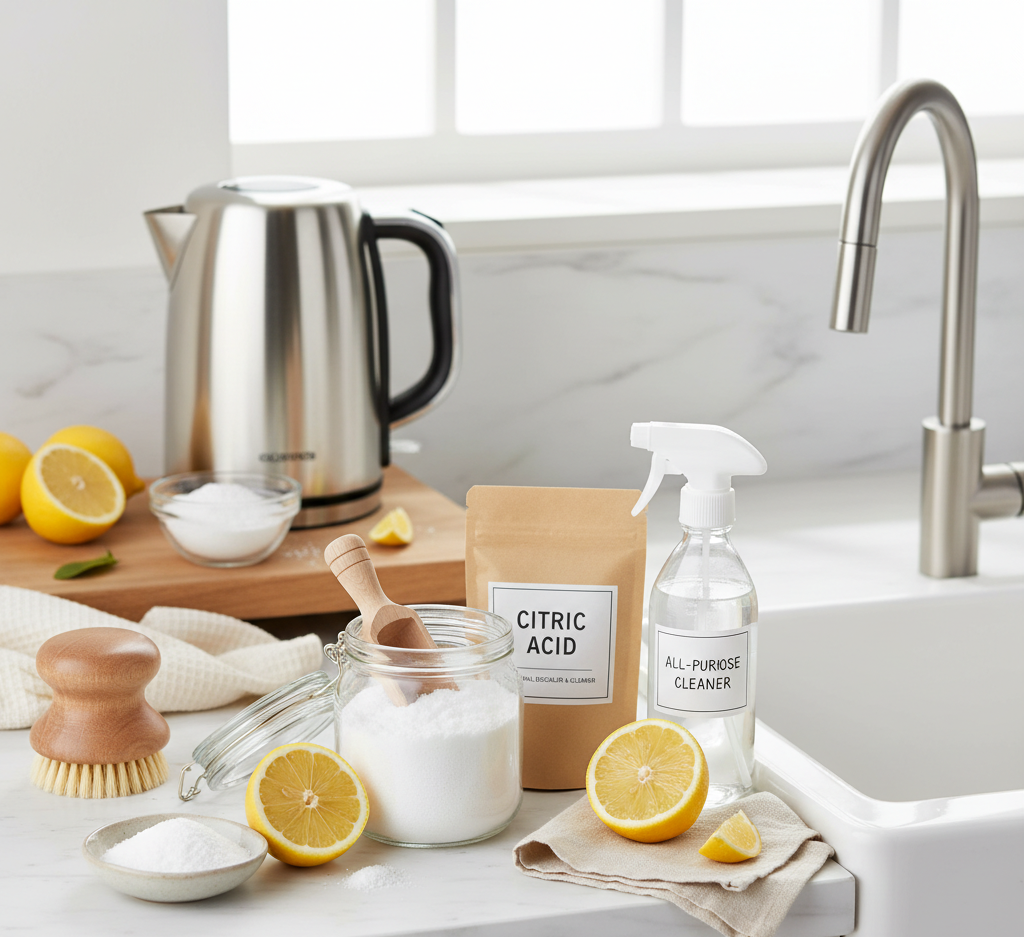
Kettle
One of the most satisfying applications for citric acid is restoring a kettle caked with mineral deposits. Over time, the inside of a kettle can become layered with a thick, white scale that not only looks unpleasant but can also impair its heating efficiency and flake off into your water. To effortlessly clean it, simply fill the kettle about halfway with water, add one to two tablespoons of citric acid powder, and bring it to a boil. Once it has boiled, turn it off and let the solution sit for twenty to thirty minutes. You will often be able to see the limescale fizzing and dissolving. After the waiting period, pour out the solution and rinse the kettle thoroughly with fresh water a few times. The interior will be left sparkling clean, looking almost new, with no scrubbing required. This same principle applies perfectly to automatic coffee makers, which also suffer from internal mineral buildup that can slow down the brewing process and affect the taste of your coffee. To descale a coffee machine, fill the water reservoir with your normal amount of water and dissolve a tablespoon or two of citric acid into it. Run a full brewing cycle with this solution (without any coffee grounds). Afterwards, run at least two more full cycles with only fresh, plain water to ensure all traces of the acid are rinsed out of the machine’s internal components.
Dishwasher
This descaling power extends to the workhorse of the kitchen, the dishwasher. A dishwasher in a hard water area can quickly become inefficient as its spray arms, filter, and interior walls get coated in a film of limescale and soap scum. This not only looks grimy but can prevent the machine from cleaning your dishes properly, leaving them spotty and cloudy. To deep clean your dishwasher, ensure it is completely empty. Pour about half a cup of citric acid powder into the bottom of the machine, or place it in the main detergent dispenser. Then, run the dishwasher on its hottest, longest cycle. The hot water will activate the acid, which will circulate throughout the entire system, dissolving mineral deposits from the jets, pipes, and walls, leaving the stainless steel interior gleaming and helping the appliance run more efficiently.
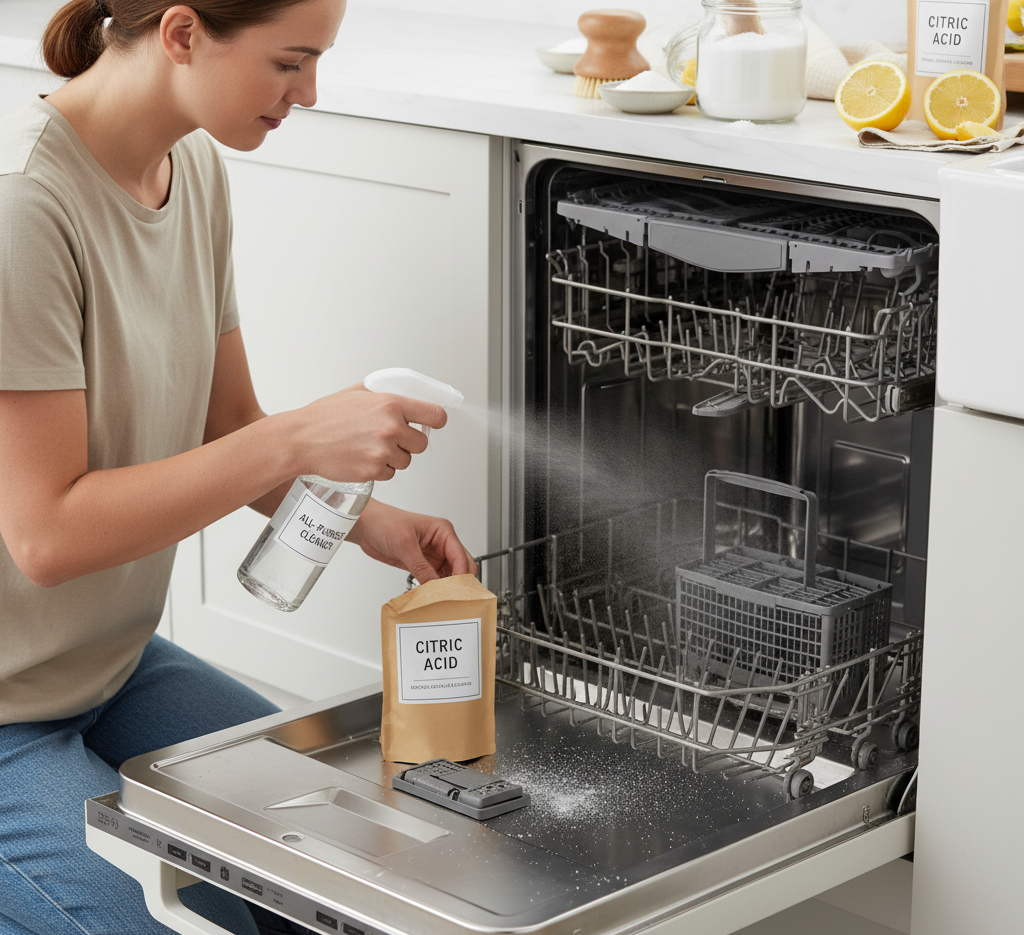
Beyond descaling appliances, citric acid makes an excellent all-purpose cleaning spray for various kitchen surfaces. To create a general cleaning solution, dissolve one to two tablespoons of citric acid powder in about a liter of warm water in a spray bottle. Shake it well until the crystals are fully dissolved. This spray is fantastic for cutting through grease and grime on countertops, cleaning sinks, and shining up stainless steel faucets and appliances. It effectively removes water spots and leaves a streak-free shine. It can also be used to disinfect and deodorize cutting boards. Simply sprinkle a small amount of the powder onto a damp board, scrub with a sponge, let it sit for a few minutes, and then rinse thoroughly. However, a critical word of caution is necessary here: because it is an acid, this solution should never be used on natural stone surfaces like marble, granite, or travertine. The acid will react with the calcium carbonate in the stone, causing permanent etching and dulling the finish.
Bathroom
Moving from the kitchen to the bathroom, citric acid proves its worth against the relentless duo of soap scum and limescale. Soap scum, the grimy film that builds up on shower doors, tiles, and bathtubs, is formed when the fatty acids in soap react with the mineral ions in hard water. Citric acid is uniquely suited to tackle both components of this problem. Using your prepared spray solution, generously coat the affected surfaces. Let it sit for ten to fifteen minutes to allow the acid time to break down the deposits. Then, scrub with a non-abrasive sponge or brush and rinse well with water. For shower doors plagued by cloudy water spots, this method will restore clarity and shine. Showerheads are another common casualty of hard water, becoming clogged with limescale until the water sprays out in uneven, weak jets. To clean a clogged showerhead without removing it, fill a plastic bag with your citric acid and water solution, submerge the showerhead completely in the liquid, and secure the bag in place with a rubber band or twist tie. Leave it to soak for at least an hour, or even overnight for severe buildup. After soaking, remove the bag and run the shower on hot for a minute to flush out any remaining dissolved particles.
Even the toilet bowl, a frequent site of stubborn hard water rings and stains, can be cleaned effectively with citric acid. The harsh chemicals often used for this task can be overpowering and environmentally taxing. As a gentler but equally potent alternative, simply pour about half a cup of citric acid powder directly into the toilet bowl before you go to bed. Let it sit overnight without flushing. In the morning, give the bowl a quick scrub with a toilet brush, and the mineral rings and stains will have dissolved, making them easy to wipe away.
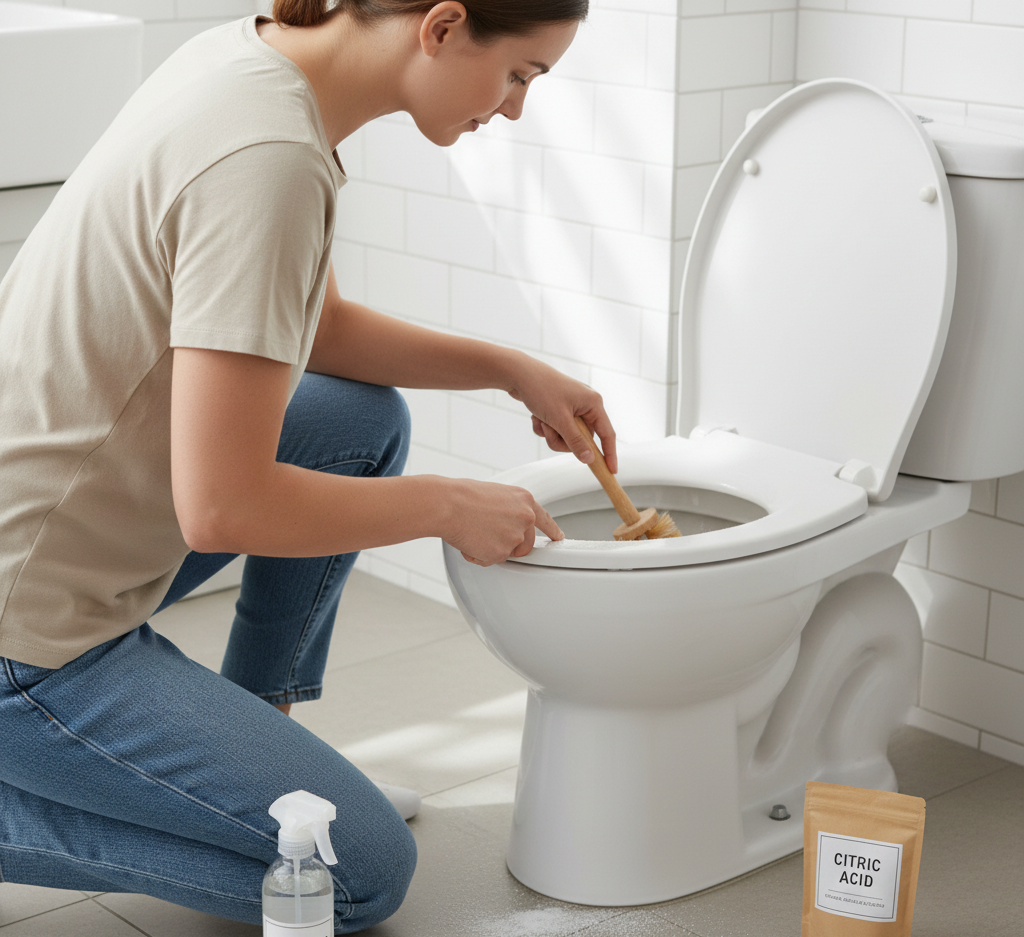
Clothes
Its usefulness doesn’t stop at solid surfaces; citric acid also has a place in the laundry room. If you live in an area with hard water, you may notice that your clothes feel stiff, your whites look dingy, and your colors appear faded. This is because the minerals in the water interfere with the detergent’s effectiveness and can leave deposits on the fabric fibers. By adding about a quarter cup of citric acid to your main wash cycle along with your regular detergent, you can soften the water. The citric acid chelates the minerals, preventing them from interfering with the soap and allowing it to clean your clothes more effectively. This results in brighter, softer laundry without the need for commercial water softeners, which often contain fragrances and other chemicals. It can also be helpful in removing certain types of stains, such as rust spots, from clothing.
Be careful
While its cleaning power is impressive, it is essential to handle citric acid with appropriate care. Although it is a food-grade, natural product, it is still an acid and can cause irritation. It’s wise to wear gloves when cleaning with it, especially if you have sensitive skin or are working with it for an extended period. Avoid getting the powder or solution in your eyes, and if you do, rinse immediately with plenty of water. The most important rule to remember is its reactivity with certain materials. As mentioned, never use it on natural stone. It’s also best to avoid using it on unsealed grout, brass-plated fixtures (as it can strip the plating), or certain very old, delicate antiques. As with any new cleaning product, it’s always a good idea to test it on a small, inconspicuous area first. Lastly, never mix citric acid with chlorine bleach, as this can produce toxic chlorine gas.
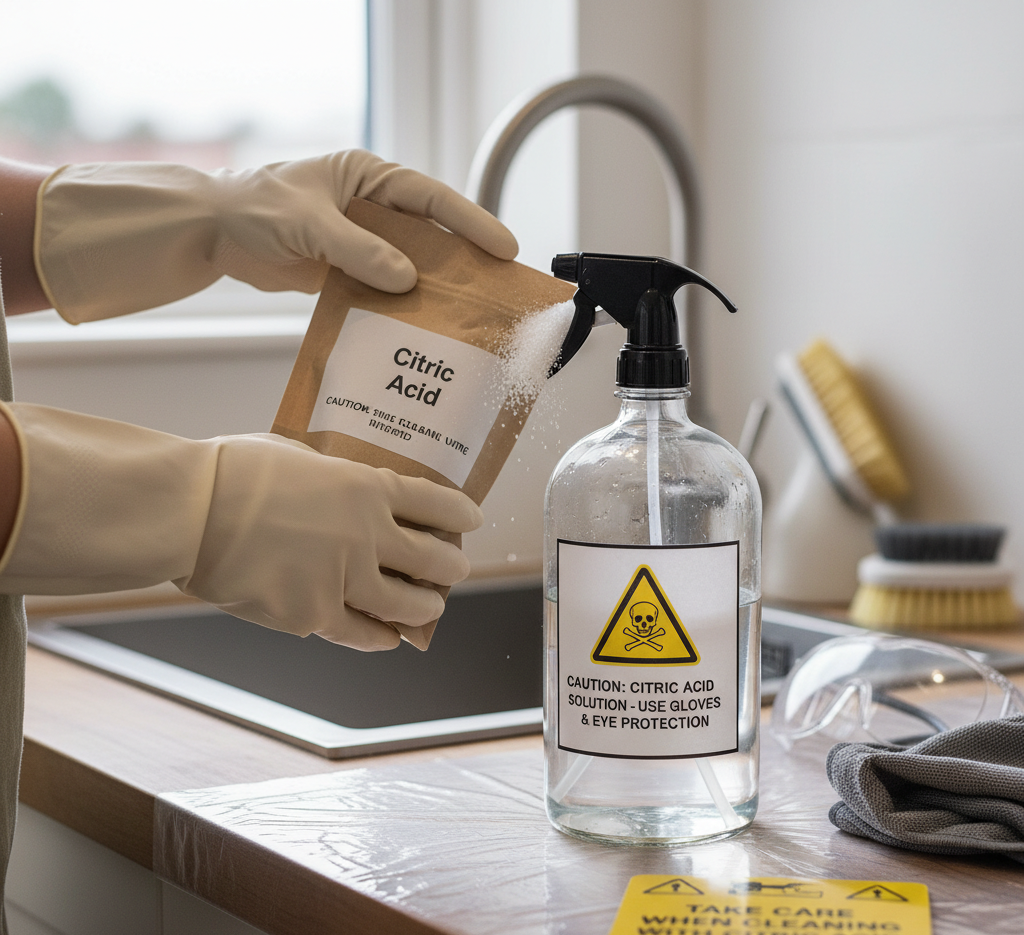
In an era where many are seeking more sustainable, cost-effective, and multi-purpose cleaning solutions, citric acid stands out as an exceptional choice. It is inexpensive, biodegradable, and incredibly effective, replacing a multitude of specialized, single-use chemical cleaners. From restoring the shine to your kettle to brightening your laundry, its ability to dissolve the stubborn mineral deposits that plague so many households makes it an indispensable tool for a deeper, more satisfying clean.
Just as citric acid works on a chemical level to dissolve stubborn limescale and restore surfaces to their original brilliance, Toronto Shine Cleaning delves deep to tackle all forms of deep-seated grime in your home. For a complete and professional clean that goes beyond surface spots, our services ensure every corner of your space is left truly spotless.













